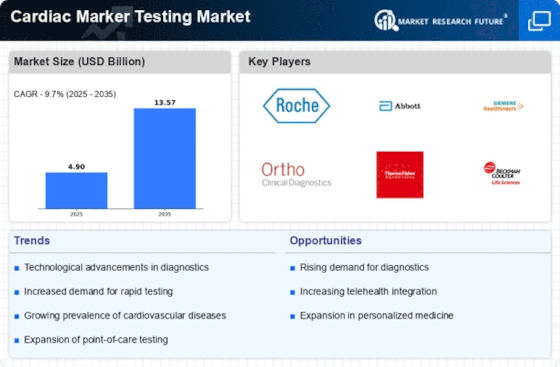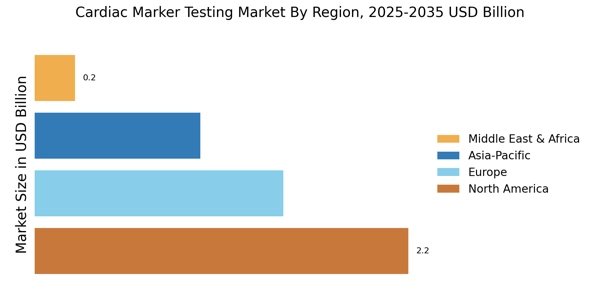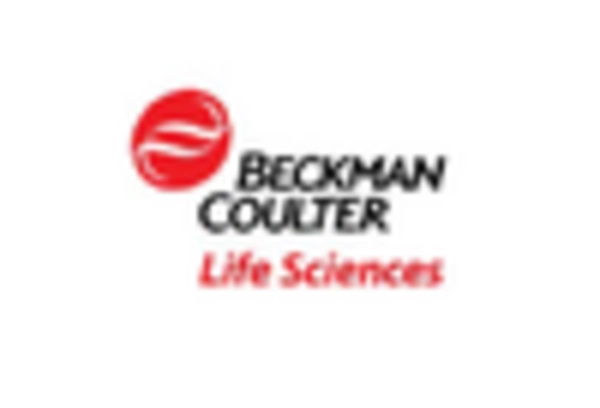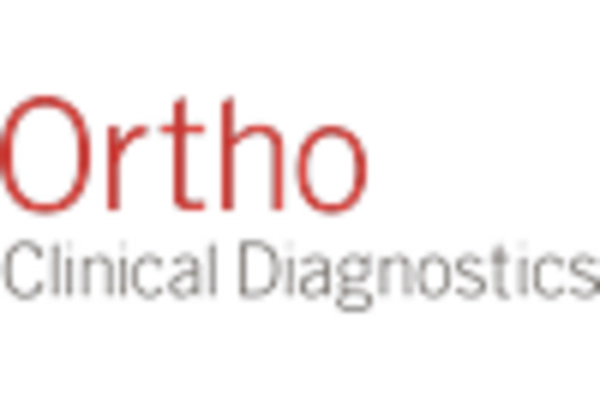Growing Awareness of Heart Health
The rising awareness of heart health among the general population is a crucial driver for the Cardiac Marker Testing Market. Educational campaigns and initiatives by health organizations have led to increased public knowledge regarding the importance of early detection of heart diseases. This heightened awareness encourages individuals to seek preventive testing and regular health check-ups, thereby driving demand for cardiac marker testing. Furthermore, as more people recognize the risk factors associated with cardiovascular diseases, the Cardiac Marker Testing Market is likely to see a surge in testing requests. This trend is expected to continue as healthcare providers emphasize the significance of proactive health management, ultimately contributing to the growth of the market.
Expansion of Healthcare Infrastructure
The expansion of healthcare infrastructure is a significant factor driving the Cardiac Marker Testing Market. As countries invest in improving their healthcare systems, the availability of advanced diagnostic tools, including cardiac marker tests, is increasing. New hospitals and diagnostic centers are being established, particularly in underserved regions, which enhances access to cardiac care. This expansion is likely to facilitate the adoption of cardiac marker testing as part of routine clinical practice. Moreover, the growing number of healthcare facilities is expected to create a competitive environment, prompting providers to offer more comprehensive testing services. Consequently, the Cardiac Marker Testing Market is poised for growth as healthcare infrastructure continues to develop.
Rising Incidence of Cardiovascular Diseases
The increasing prevalence of cardiovascular diseases is a primary driver for the Cardiac Marker Testing Market. According to recent data, cardiovascular diseases account for a substantial percentage of global mortality rates, necessitating effective diagnostic tools. As healthcare providers seek to improve patient outcomes, the demand for cardiac marker testing has surged. This trend is further supported by the aging population, which is more susceptible to heart-related ailments. Consequently, the Cardiac Marker Testing Market is experiencing growth as hospitals and clinics invest in advanced diagnostic technologies to facilitate early detection and timely intervention. The integration of cardiac markers into routine clinical practice is likely to enhance the accuracy of diagnoses, thereby improving patient management and treatment strategies.
Technological Innovations in Testing Methods
Technological advancements in testing methods are significantly influencing the Cardiac Marker Testing Market. Innovations such as high-sensitivity troponin assays and point-of-care testing devices have revolutionized the way cardiac markers are measured. These advancements not only enhance the accuracy and speed of diagnosis but also improve accessibility for patients. The introduction of automated systems and digital platforms for data analysis further streamlines the testing process, making it more efficient. As a result, healthcare facilities are increasingly adopting these technologies, leading to a projected growth rate of the Cardiac Marker Testing Market. The ongoing research and development in this field suggest that future innovations may further refine testing methodologies, potentially expanding the range of detectable cardiac markers.
Integration of Cardiac Markers in Clinical Guidelines
The incorporation of cardiac markers into clinical guidelines is shaping the Cardiac Marker Testing Market. Medical associations and regulatory bodies are increasingly recommending the use of specific cardiac markers for diagnosing and managing heart conditions. This standardization not only enhances the credibility of cardiac marker testing but also encourages healthcare providers to adopt these practices in their clinical workflows. As guidelines evolve, the demand for reliable and standardized testing methods is likely to increase, further propelling the Cardiac Marker Testing Market. The alignment of testing protocols with clinical best practices may also lead to improved patient outcomes, reinforcing the importance of cardiac marker testing in contemporary healthcare.

















